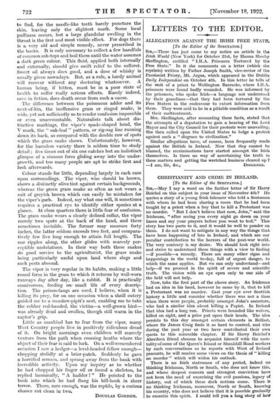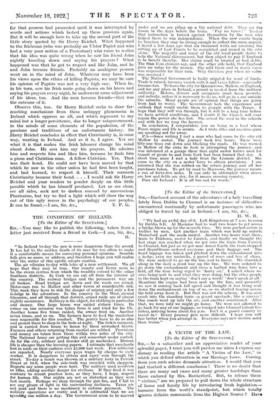CHRISTIANITY AND CRIME IN IRELAND.
[To the Editor of the SPECTATOR.] Siza,—May I say a word on the further letter of Sir Harry Reichel on this subject in your issue of November 4th? He quotes a story of a young Irish labourer who told a Scotsman with whom he had been sharing a room that he had been taught by a priest when a boy that to kill a Protestant was no murder. " But I don't believe that now, John," said the Irishman, " after seeing you every night go down on your knees and say your prayers before you went to bed." This story has two parts to it, and it would be well to ponder on them. I do not want to mitigate in any way the things that have been happening of late in Ireland, and which are our peculiar contribution to the horrors of the post-war world. The very contrary is my desire. We should look right into and strive to understand these things with a view to finding —if possible—a remedy. There are many other signs and happenings in the world to-day, full of urgent danger, to which the same applies. But we can only understand—and help—if we proceed in the spirit of severe and scientific truth. The vision with an eye open only to one side of the field will not help.
Now, take the first part of the above story. An Irishman had an idea in his head, however he came by it, that to kill a Protestant was no murder. Cast your eye over Scottish history a little and consider whether there was not a time when there were people, probably amongst John's ancestors, who had a similar idea about killing a Papist. In Ireland that idea had a long run. Priests were hounded like wolves, killed on sight, and a price put upon their heads. The idea persists to this day amongst certain elements in Belfast, whom Sir James Craig finds it so hard to control, and who during the past year or two have contributed their own quota to this miserable chapter. If Sir Harry Reichel's Aberdeen friend chooses to acquaint himself with the men- tality of some of the Queen's Island or Shankhill Road workers by such conversations as he reports with West of Ireland peasants, he will receive some views on the thesis of " killing no murder " which will widen his outlook.
There is no Irish statesman of any period, indeed no thinking Irishman, North or South, who does not know this, and whose deepest concern and strongest conviction have not been the need of exorcizing the evil passions, legacy of history, out of which these dark notions come. There is no thinking Irishman, moreover, North or South, knowing his country, who does not believe that it is possible gradually to exorcize this spirit. I could tell you a long story of how
far that process had proceeded until it was interrupted by words and actions which lashed up these passions again. But it will be enough here to take up the second part of the little story quoted by Sir Harry Reichel. What happened to the Irishman (who was probably an Ulster Papist and who had a very poor notion of a Protestant) who came to realize that his idea was quite wrong when he saw his friend John nightly kneeling down and saying his prayers ? What happened was that he got to respect and like John, and he and John became friends. Probably an analogous process went on in the mind of John. 'Whatever may have been his views upon the ethics of killing Papists, we may be sure his opinion of Papists was not a very high one. When he, in his turn, saw his Irish mate going down on his knees and saying his prayers every night, he underwent some adjustment of his ideas, too. And the men became friends—that was the outcome of it.
Observe this, too. Sir Harry Reichel seeks to draw far- reaching conclusions from these unhappy phenomena in Ireland which oppress us all, and which represent to my mind but a longer persistence, due to longer misgovernment, in the minds of some elements of the population, of the passions and traditions of an unfortunate history. Sir ,Harry Reichel concludes in effect that Christianity is, in some way, wanting in Ireland. And so it is, I agree. Yet see what it is that makes the Irish labourer change his mind about John. He sees him say his prayers. He admires him and respects him and likes him, because he finds him a pious and Christian man. A fellow Christian. Yes. That was their bond. He could not have been moved by that which he saw in the other unless he had first been taught, and had learned, to respect it himself. Their common Christianity became their bond. . . . I would ask Sir Harry Reichel and your readers to ponder deeply on this little parable which he has himself produced. Let us see clear, see all sides, seek not to darken counsel by unconscious Pharisaism, but try to find a light which will show the way out of this ugly recess in the psychology of our peoples.
It can be found.—I am, Sir, &c., T. P. G.







































 Previous page
Previous page